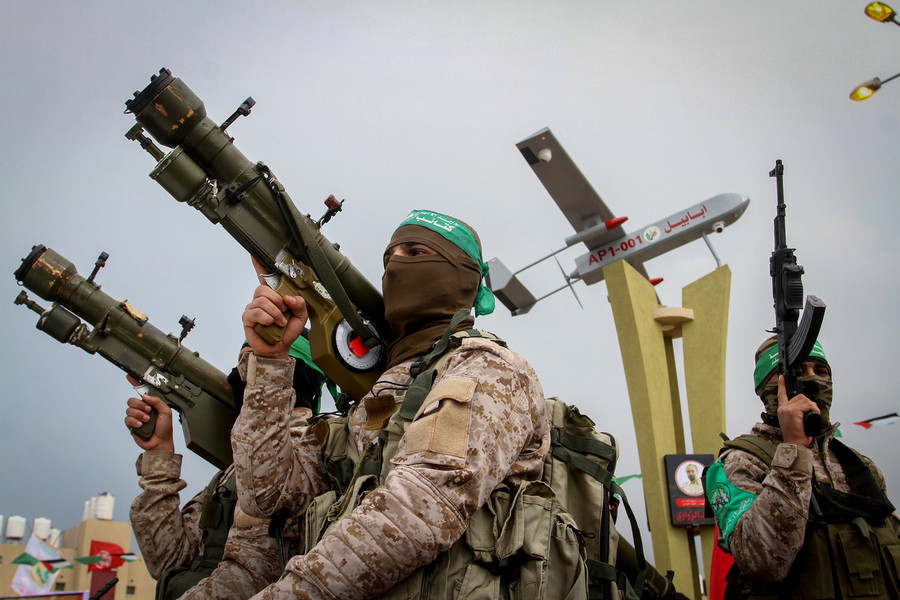Hamas woes, decade after its coup
Long before Islamic State first grabbed international attention in 2014 through its brutal conquests in Iraq and Syria, another terrorist organization had already solidified its grip on a narrow piece of land wedged between the regional powers of Israel and Egypt.
Since seizing control of the Gaza Strip in mid-June 2007, Hamas has survived a maritime blockade, international isolation, multiple wars with Israel and pressure from other Palestinian factions while forming its terrorist regime in Gaza. Yet a decade after Hamas’s territorial coup, recent developments in Mideast geopolitics may provide another challenge to the Palestinian terror group’s chokehold.
Ghaith al-Omari, a senior fellow at the Washington Institute for Near East Policy and a former Palestinian Authority (PA) adviser, said Hamas has been able to stay in power due to a very low threshold for survival.
“Most Palestinians in Gaza would point to Israel as the primary culprit in the death and destruction resulting from the three rounds of hostilities [with Hamas]. This sentiment has allowed Hamas to repeatedly cast mere survival as a victory,” Omari told JNS.org.
Nevertheless, Omari said many Gazans have blamed Hamas for triggering wars with Israel that have resulted in minimal achievements for the terror group, and for the failure of reconstruction efforts in Gaza following the latest war with Israel in the summer of 2014.
“Gaza residents continue to experience tremendous humanitarian and economic hardship, including limited electricity, lack of reconstruction materials, and worsening health, sanitation and water conditions, due to the system of restrictions on the movement of people and goods imposed by Israel and more recently Egypt,” he said.
Meanwhile, Hamas has remained steadfast in its commitment to Israel’s destruction despite the consequences for Gazan Palestinians.
Hamas refuses to adhere to international condiPalestinian discontent
For many years before Hamas’s takeover of Gaza, the Palestinian terror group had strong support among the Palestinian people. While its uncompromising position towards Israel played a large role in this reputation, Palestinians also viewed Hamas as less corrupt than Fatah and the PA, as well as a provider of important public services like education and medical care.
These perceptions propelled the terror group to victory in the 2006 Palestinian legislative elections, and Hamas seized control of Gaza a year later. But a decade of Hamas rule in Gaza, Omari explained, “has shown Hamas to be corrupt, whether in terms of nepotism, favoritism towards its members and supporters, or direct corruption by some senior leaders and their families. Hamas’s heavy-handed response to dissent has shattered any illusion of the movement being in any way democratic.”
Now, animosity between the Palestinian factions seems to be worsening as the PA seeks to regain influence in Gaza by applying pressure on Hamas. The PA recently decided to decrease its subsidization of Gaza’s electricity (which is provided by Israel) to 60 percent of the $11.3 million monthly cost. In April, the PA cut its Gaza-based employees’ salaries.
Shifting regional dynamics
Saudi Arabia, Egypt, Bahrain, the United Arab Emirates and other Arab countries announced in early June they would cut ties with Qatar, a top regional ally of Hamas. Following the announcement, Saudi Foreign Minister Adel al-Jubeir called on Qatar to end support for Hamas and its parent group, the Muslim Brotherhood, also a terrorist organization.
“Qatar is the main Arab supporter of Hamas, allowing the movement’s leadership to be based in Doha, and to use Al Jazeera satellite TV and other Qatari media to promote Hamas,” Omari said.
Yet Qatar has made it clear it still backs Hamas, even as leaders of the Palestinian terror group — including Saleh al-Arouri, who helped plan the kidnapping and murder of three Israeli teens in June 2014 — are expelled from the Gulf nation.
“Losing Qatari financial support,” he said, “could further exacerbate the economic and humanitarian situation in Gaza, increasing the possibility of another round of hostilities there.”

 48.0°,
Light Drizzle Fog/Mist
48.0°,
Light Drizzle Fog/Mist 




